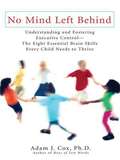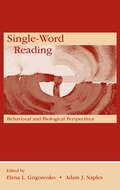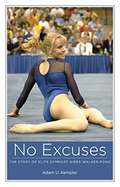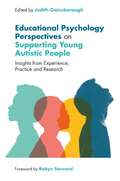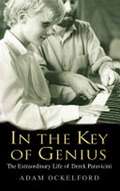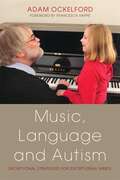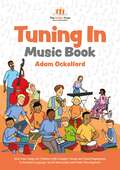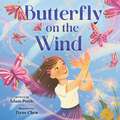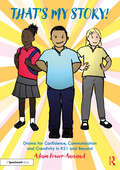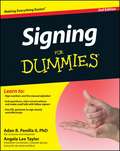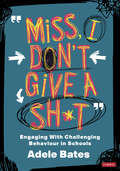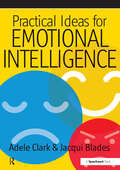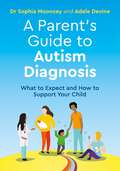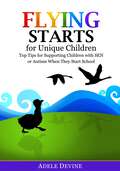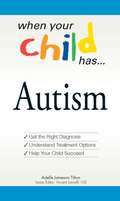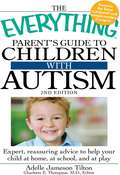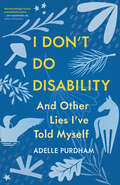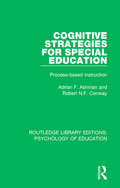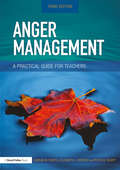- Table View
- List View
No Mind Left Behind
by Cox Adam J.From the cutting edge of brain science, eight crucial skills for children's future success-now in paperback. From a clinical psychologist who has devoted his clinical and research work to the study of executive control skills, here is a program for helping children master the eight essential cognitive skills that are critical for success in life in work:* Taking initiative * Screening out distractions* Organizing * Thinking flexibly* Planning * Regulating emotions* Self-monitoring * Using memory effectivelyUsing case studies and anecdotes, Dr. Cox presents a comprehensive and practical plan for parents. The book addresses special-needs children as well as neurotypical children, and includes practical suggestions for parents and educators.
Single-Word Reading: Behavioral and Biological Perspectives (New Directions In Communication Disorders Research Ser.)
by Elena L. Grigorenko Adam J. NaplesAs the first title in the new series, New Directions in Communication Disorders Research: Integrative Approaches, this volume discusses a unique phenomenon in cognitive science, single-word reading, which is an essential element in successful reading competence. Single-word reading is an interdisciplinary area of research that incorporates phonolog
No Excuses: The Story of Elite Gymnast Aimee Walker-pond
by Adam KemplerThis biography traces the gymnastics career of a girl - Aimee, born deaf and blind in one eye and describes how she overcame her health struggles, learned American Sign Language, succeeded in gymnastics, enjoyed social activities, acted in movies, traveled to Hawaii and Russia, worked hard in school, competed in college, and found romance. Bruno Grandi, President of the International Gymnastics Federation, said, “Aimee has filled our hearts with the fire of warmth and love and inspired us all to become better.” Valorie Kondos Field, head women’s gymnastics coach at UCLA and winner of six NCAA National Championships, said, “Aimee’s not deaf. She just can’t hear. Why would she need two eyes, when she has one? She has no excuses.”
The Law of Disability Discrimination
by Ruth Colker Paul Grossman Adam MilaniThe purpose of this book is to provide students with an in-depth understanding of the ADA, including the sections governing employment (Title I), public entities (Title II), and public accommodations (Title III). The book focuses on the major components of the ADA, with extensive reference to the implementing regulations and accompanying guidance statements--essential building blocks for a complete understanding of the Act. It also covers a wide range of additional topics, such as education, housing, insurance, and the protection of newborns with disabilities. Because the ADA intersects several other federal statutes, such as the IDEA, the FHAA, and Section 504 of the Rehabilitation Act, cross-references to these and other statutes are frequently provided. A companion book, The Law of Disability Discrimination Handbook: Statutes and Regulatory Guidance, includes reference material relevant to interpreting federal law prohibiting discrimination on the basis of disability. The Handbook includes the statutory language of each of the five Titles of the ADA. In addition, with respect to Titles I, II, and III, the Handbook includes the regulations and interpretive guidance promulgated by the EEOC and the United States DOJ. The Handbook also includes reference material relevant to interpreting Section 504 of the Rehabilitation Act of 1973 and the Fair Housing Act Amendments of 1998, as well as excerpts from the Civil Rights Act of 1991. Further, the Handbook contains the text of the IDEA, the Department of Education Regulations implementing the IDEA, and the Convention on the Rights of Persons with Disabilities.
Educational Psychology Perspectives on Supporting Young Autistic People: Insights from Experience, Practice and Research
by Clare Hughes Carol Povey Phil Christie Luke Beardon Alexandra Lewis Sue Fletcher-Watson Prithvi Perepa Liz Pellicano Nicola Yuill Laura Cockburn Dr Laura Crane Vicky Slonims Jennifer Baulcomb Carrie Grant Scot Greathead Rhiannon Yates Bola Abimbola Diana Loffler Annie Etherington Irina Roncaglia Charlotte Hatton Jane Park Katie Maras Adam O'Loughlin Juliet Gittens Lynne Moxon Ken Greaves Alyssa Alcorn Owen Rhys BarryAn essential guide for any professionals working with autistic children and young adults, this book provides expert insights which need to be considered by professionals, parents and autistic people alike. It covers key themes such as anxiety and wellbeing, transition into adulthood, sexuality, intersectionality, and many more.A unique blend of first-hand experience, parental guidance and professional advice is provided from prominent figures in the autism field to offer you an overview of the important issues of today, to help you understand and better support autistic young people.
In The Key Of Genius: The Extraordinary Life Of Derek Paravicini
by Adam OckelfordDerek Paravicini is blind, can't tell his right hand from his left and needs round-the-clock care. But he has an extremely rare gift - he is a musical prodigy with perfect pitch whose piano-playing has thrilled audiences at venues from Ronnie Scott's to Las Vegas, the Barbican to Buckingham Palace. <p><p> Born prematurely, Derek remained in hospital for three months and technically 'died' several times before he was finally strong enough to go home. It was not long before his blindness became apparent and later it became clear that he had severe learning difficulties and autism. <p> Desperately trying to find something to engage and stimulate baby Derek, his nanny discovered a toy organ and put it down in front of him. Miraculously, Derek taught himself to play. Music proved to be an outlet for expressing himself and communicating with others - his way of dealing with a strange and confusing world.
Tuning In Music Book: Sixty-Four Songs for Children with Complex Needs and Visual Impairment to Promote Language, Social Interaction and Wider Development
by Adam OckelfordContaining 64 songs designed to promote language, social and musical development, this book accompanies the Tuning In Cards so you can perform the songs and integrate the activities into your own practice. When paired with the Tuning In Cards, it will offer an innovative way of developing communication in children with profound disabilities, visual impairment, and autism.These songs have been developed in line with the Sounds of Intent framework, and a helpful introduction by the composer describes how to adapt the songs and activities to the appropriate developmental level.
Butterfly on the Wind
by Adam PottleA magical picture book about a Deaf girl who creates a butterfly with Sign Language and sends it on a journey around the world.On the day of the talent show, Aurora's hands tremble. No matter how hard she tries to sign, her fingers stumble over one another and the words just won't come. But as she’s about to give up, she spots a butterfly. Using her hands to sign the ASL word for "butterfly," Aurora sends a magical butterfly of her own into the world, inspiring Deaf people across the globe to add their own. The butterflies grow in numbers and strength as they circle back to Aurora, bolstering her with the love and support of her worldwide Deaf community.Deaf picture book creators author Adam Pottle and artist Ziyue Chen combine powerful text and sweeping art into a moving story of resilience and self-belief.
That's My Story!: Drama for Confidence, Communication and Creativity in KS1 and Beyond
by Adam Power-AnnandThe ability to communicate is an essential life skill for all children and young people and it underpins their social, emotional and educational development. If a child experiences a positive relationship with an adult listening carefully, they are more likely to constructively share their thoughts, feelings and their imaginative ideas.That’s My Story! places children’s imagined stories at the heart of their own development and provides a joyful, creative approach to support young children’s personal and social development and to encourage their communication. In this book you will find: Tried-and-tested drama games and activities that support communication and well-being, all adaptable to complement your current practice Guidance and advice on how to promote positive adult-child interactions Examples of creative interventions that support children’s communication development A celebration of the joy that comes with carefully listening to children’s own imagined stories Those of us who work with children can sense a tangible connection between how young children feel and how they communicate. This essential and practical resource will be valuable reading for primary teachers, teaching assistants, speech and language therapists, and drama practitioners, as well as outreach and education departments of theatre companies and other arts organisations.
Australian Sign Language (Auslan)
by Trevor Johnston Adam SchembriThis is first comprehensive introduction to the linguistics of Auslan, the sign language of Australia. Assuming no prior background in language study, it explores each key aspect of the structure of Auslan, providing an accessible overview of its grammar (how sentences are structured), phonology (the building blocks of signs), morphology (the structure of signs), lexicon (vocabulary), semantics (how meaning is created), and discourse (how Auslan is used in context). The authors also discuss a range of myths and misunderstandings about sign languages, provide an insight into the history and development of Auslan, and show how Auslan is related to other sign languages, such as those used in Britain, the USA and New Zealand. Complete with clear illustrations of the signs in use and useful further reading lists, this is an ideal resource for anyone interested in Auslan, as well as those seeking a clear, general introduction to sign language linguistics.
Signing For Dummies
by Angela Lee Taylor Adan R. Penilla IIThe fast and easy way to grasp this evolving and growing languageAmerican Sign Language (ASL) is something we've all seen deaf people use in restaurants, hospitals, airports, and at work. The communication is fascinating to watch; to see people sharing ideas by using handshapes and body language is remarkable in a world so defined by sound. This new edition of Signing For Dummies gives you a general understanding of the properties of Sign, as well as an understanding of deaf culture. Designed to act as an introduction or a refresher, the book focuses solely on ASL, which is the most commonly used sign language in the United States. Categorized by subject, this illustrated guide covers grammar and sentence structure, along with the tools to get you going in basic conversation by knowing how to introduce and greet people; ask questions and make small talk; order food and chat with salespeople; handle medical emergencies; talk on the phone; get around town for fun or business; and much more. Plus, it stresses how ASL isn't just about using your fingers, hands, and arms, but also about facial expression and body language.More than 25 percent new and revised content, including the latest technological advances for the deaf; contact signing, code mixing, code switching, interpreting as a profession, and regionalism in signingPacked with "Fun & Games" sections that invite you to practice specific signsHundreds of illustrations throughout, plus a video CD featuring demonstrations by ASL signers showing actual conversationsSigning For Dummies is the fast and fun way to get you moving your hands, body, and face to convey meaning that reaches beyond linguistic barriers.
"Miss, I don’t give a sh*t": Engaging with challenging behaviour in schools (Corwin Ltd)
by Adele BatesDo you want to be an inspiring teacher for everyone you teach, even the trickier cherubs in your class? Or maybe you just want to get through a lesson without a desk flying at you or a blazer being set alight? In this down-to-earth book Adele Bates shares practical approaches, strategies and tips from the classroom on how to help pupils with behavioural needs thrive with their education. Packed full of real-life classroom scenarios, student voice and relevant theory, every chapter offers an Action Box helping you to implement these strategies – next lesson, next week and long term. From relationship building and teaching self-regulation, to fostering inclusivity, paying attention to your own self-care and schoolwide approaches, Adele Bates unpicks some of the most difficult aspects of being a teacher and empowers you to grow as a confident classroom professional.
"Miss, I don’t give a sh*t": Engaging with challenging behaviour in schools (Corwin Ltd)
by Adele BatesDo you want to be an inspiring teacher for everyone you teach, even the trickier cherubs in your class? Or maybe you just want to get through a lesson without a desk flying at you or a blazer being set alight? In this down-to-earth book Adele Bates shares practical approaches, strategies and tips from the classroom on how to help pupils with behavioural needs thrive with their education. Packed full of real-life classroom scenarios, student voice and relevant theory, every chapter offers an Action Box helping you to implement these strategies – next lesson, next week and long term. From relationship building and teaching self-regulation, to fostering inclusivity, paying attention to your own self-care and schoolwide approaches, Adele Bates unpicks some of the most difficult aspects of being a teacher and empowers you to grow as a confident classroom professional.
Practical Ideas for Emotional Intelligence
by Adele Clark Jacqui BladesThis book covers a wide range of emotional literacy topics relevant to todays young people and can be used in any setting by learning mentors and other professionals. Each topic includes group and individual session activities, solutions to problems, take home tasks and tips for the professional. It can be used when designing and implementing individual behavior plans and helping young people overcome the challenges in life. It is unique in that a professional in any setting can readily adapt the ideas to their requirements. The topics covered are: profiling, changing, behavioral change, self-esteem, bereavement, family change, study skills, stress busting, motivation, self learning, drug awareness, bullying, school refusal and frustration. The book contains ideas and suggestions which can be readily adapted by the professional to best suit their setting. It is one of the few resources which cover all aspects of emotional intelligence for all ability groups.
A Parent's Guide to Autism Diagnosis: What to Expect and How to Support Your Child
by Adele Devine Sophia MoonceyAutism diagnosis can be an overwhelming time for many families. This is an accessible, easy to navigate guide for parents, answering the questions they may have before, during and after diagnosis. Written by a highly experienced author team, this book will support parents from the moment somebody mentions autism, through the diagnosis process and beyond. It provides reliable advice on every stage, with guidance on what to do during the long wait for assessment and diagnosis. Working from a pro-neurodiversity perspective it encourages parents to see beyond the diagnosis and to celebrate each child's unique personality and strengths. Combining information on medical diagnosis, educational needs and more, the book shares case studies and direct quotes from families to help parents to give their children the best start following an autism diagnosis, and help them to achieve their full potential. There is also a bonus downloadable chapter with information from the key professionals involved in the diagnostic process, so you know who you can turn to for the support and help you need.
Flying Starts for Unique Children: Top Tips for Supporting Children with SEN or Autism When They Start School
by Adele DevineHelp children with SEN and autism to have a good first impression of your school and it can make all the difference to their entire school experience. Regular Teach Early Years contributor and SEN expert Adele Devine shares her top tips for making the school environment as welcoming and inclusive as possible for children with SEN and autism. This book covers essential topics such as working with parents, supporting transitions between home and school, helping children with sensory issues to cope in a stimulating classroom, teaching waiting and patience skills, using visual teaching methods, understanding behaviour, promoting independence and much more. Case studies and practical examples show you exactly how a truly inclusive classroom can be achieved, by demonstrating how a range of situations are experienced from the child's perspective. Designed to be perfect for dipping into and referring back to as problems arise, this book is a fantastic resource for busy educators.
When Your Child Has . . . Autism (When Your Child Has A . . .)
by Vincent Iannelli Adele Jameson TiltonHearing the words ôyour child has Autismö is more common than ever. But dealing with this news will never be easy. When the devastating diagnosis is made, millions of questions and concerns will flood parentsÆ brains. This book will answer panicked parentsÆ questions in clear and complete terms. Taking an in-depth look at the reality of the disability, its causes, and how to cope as a family, this professional yet personal primer will help parents get through those first oh-so-tough times after the diagnosis. Autism is a complex developmental disabilityùthere are no medical tests for diagnosing autism and there is no ôcure.ö Parents need an accessible resource to go to for help in a hurryùwhen they donÆt know where else to turn and what is going to happen next.
The Everything Parent's Guide to Children with Autism
by Adelle Jameson Tilton Charlotte E. ThompsonLife with a child with autism can be challenging, exhausting, and - ultimately - very rewarding. For parents, even daily activities like getting dressed or grocery shopping can become daunting exercises. Children with autism require special strategies, and parents must learn how to think with their child instead of against him.This comprehensive guide offers practical advice, reassurances, and real-life scenarios to help families get through each day. You'll discover how to:Communicate effectively with their childFind a school that meets their child's needsHandle meltdowns in public or privateLearn about assistive devicesFind intervention and support groupsFull of useful information, expert advice, and positive techniques, this guide is the valuable tool you and your family need to make the most of every day - one interaction at a time!
The Everything® Parent's Guide To Children With Autism (2nd Edition)
by Adelle Jameson Tilton Charlotte E. ThompsonYou know that life with a child with autism can be challenging, exhausting, and—ultimately—very rewarding. When even daily activities like getting dressed or grocery shopping become daunting exercises, you need practical advice, expert reassurance, and real-life tips to help your family get through each day. The Everything Parent's Guide to Children with Autism, 2nd Edition has all that—and more! Children with autism require special strategies, and you must learn how to look beyond the autism diagnosis and appreciate your child's unique qualities. With this comprehensive guide, you'll discover how to: Communicate effectively with your child Find a school that meets your child's needs Handle meltdowns in public or private Learn how diet can affect your child's health and behavior Find intervention and support groups Full of useful information, expert advice, and positive techniques, The Everything Parent's Guide to Children with Autism, 2nd Edition is the valuable tool you and your family need to make the most of every day—handling the challenges with confidence and taking time to savor the rewards of life with your child.Show more
I Don't Do Disability and Other Lies I've Told Myself
by Adelle Purdham“A tender, beautifully written essay collection that is about so much more than parenting a child with a disability.” — Erin Pepler, author of Send Me Into The Woods AloneA raw and intimate portrait of family, love, life, relationships, and disability parenting through the eyes of a mother to a daughter with Down syndrome.With the arrival of her daughter with Down syndrome, Adelle Purdham began unpacking a lifetime of her own ableism. In a society where people with disabilities remain largely invisible, what does it mean to parent such a child? And simultaneously, what does it mean as a mother, a writer, and a woman to truly be seen? The candid essays in I Don’t Do Disability and Other Lies I’ve Told Myself glimmer with humanity and passion, and explore ideas of motherhood, disability, and worth. Purdham delves into grief, rage, injustice, privilege, female friendship, marriage, and desire in a voice that is loudly empathetic, unapologetic, and true. While examining the dichotomies inside of herself, she leads us to consider the flaws in society, showing us the beauty, resilience, chaos, and wild within us all.
Ochún y yo: Oshún and Me: A Story of Love and Braids
by Adiba NelsonAudiolibro debut de Adiba Nelson, Ochún y Yo, es una conmovedora oda a la familia, la identidad y la belleza de las trenzas. ¡También disponible en inglés!¡Es domingo y eso significa que es el día de hacerte el pelo! Mientras Mami teje oro y conchas de cauri en el cabello de Yadira, le cuenta la historia de la diosa Ochún, mostrándole a Yadi cómo su herencia afro latina está amorosamente tejida en cada trenza y concha.Al día siguiente, Yadi llega a su primer día en una nueva escuela. Está nerviosa por hacer amigos, pero con sus hermosas trenzas, el clic-clac de las conchas de cauri y un poco de guía de Ochún, ella descubre que tiene todo lo que necesita para ser su mejor y más auténtica versión de sí misma. Al final del libro se incluye una carta del autor e información sobre diferentes tipos de peinados trenzados.
Oshún and Me: A Story of Love and Braids
by Adiba NelsonTenderly illustrated by Alleanna Harris, Adiba Nelson's debut picture book Oshún and Me is a heartwarming ode to family, identity, and the beauty of braided hair. Also available in Spanish!It’s Sunday, and that means it’s Hair Day! As Mami weaves gold and cowrie shells into Yadira’s hair, she tells her the story of the goddess Oshún, showing Yadi how her Afro Latin heritage is lovingly tucked into each braid and shell.The next day, Yadi arrives for her first day at a new school. She's nervous about making friends, but with her beautiful braids, the click-clack of the cowrie shells, and a little guidance from Oshún, she finds she has everything she needs to be her best, most authentic self.A letter from the author and visual examples of different kinds of braided hairstyles are included in the back of the book.
Cognitive Strategies for Special Education: Process-Based Instruction (Routledge Library Editions: Psychology of Education)
by Adrian F. Ashman Robert N.F. ConwayResearch on training programs for students with learning difficulties has usually focused on the development of social and behavioural skills and the acquisition of cognitive interventions and procedures. Originally published in 1989, this book attempts to apply the methods validated by research and synthesize the discoveries made in the psychological laboratory for the benefit of teachers in regular classrooms. It reviews the literature relevant to special needs teaching and traces the development of cognitive research as it applies to education. The authors propose a specific and practical teaching strategy which has been successfully used by those working with students with special needs. Starting from the basic belief that education is an interactive process between the participants, the authors have emphasised the role and responsibility both of the teacher and the learner. Their book should be of value to researchers and practitioners in psychology and special education.
Anger Management: A Practical Guide for Teachers
by Elizabeth Herrick Adrian Faupel Peter M. SharpDo you work with angry children? Are you wondering why young people don’t listen when they are angry? Are you exhausted from trying to understand angry behaviour? Are you having difficulty finding specialist help as soon as you need it? Anger Management is a practical guide that will help you to stay calm in the face of angry outbursts from children and young people, and support them in learning to manage their anger better. Written by chartered psychologists with extensive experience in the field, this helpful book will: increase your understanding of anger; offer you a range of practical management interventions; help you to manage your own behaviours to build more effective relationships; reduce the stress experienced by staff and parents who lack confidence in the face of aggressive behaviour. With stress and anger levels amongst young people at an all-time high, this third edition of Anger Management is particularly timely. It reflects significant developments in the fields of neuropsychology and our understanding of the physiology of emotions, as well as updated research into attachment theory, resilience, Acceptance and Commitment therapy and positive psychology. New sections include the importance of teaching forgiveness, gratitude and compassion, Mindfulness, the benefits of exercise, practical advice for Teaching Assistants and a ‘how to’ guide to managing risk. The book also discusses the revised Code of Practice for children and young people with Special Educational Needs and Disabilites (SEND 2014) and explores the implications of these changes for practitioners. Containing helpful worksheets, examples, explanations and practical advice, Anger Management provides targeted support for anyone working directly with children and young people to enable you to cope with angry behaviour in the best way possible, which is crucial for the wellbeing of adult and child alike. This book will prove invaluable to teachers as well as parents, teaching assistants, carers, psychologists, social workers and health care workers.
